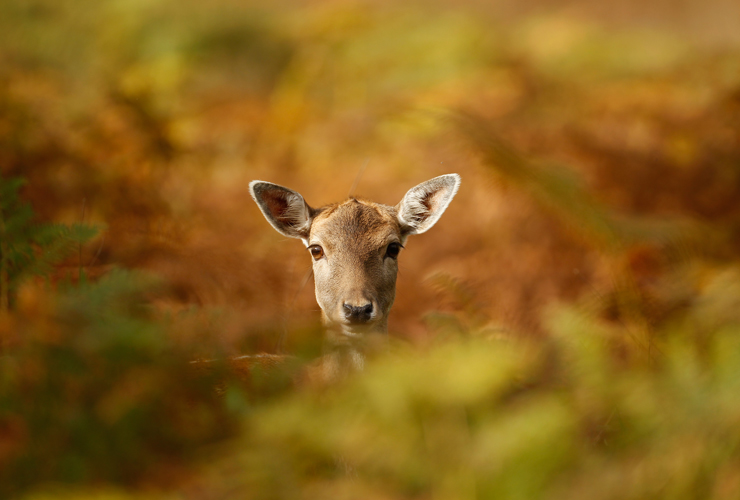Does ‘zombie deer disease’ pose a threat to humans?
Scientists say people who eat the infected meat may be at risk of condition similar to BSE

A free daily email with the biggest news stories of the day – and the best features from TheWeek.com
You are now subscribed
Your newsletter sign-up was successful
A new condition similar to “mad cow disease” is spreading quickly among animals in North America - and scientists fear it could cross over and infect humans.
Chronic wasting disease (CWD) - dubbed “zombie deer disease” - has infected deer, elk and moose across 24 US states and two Canadian provinces.
A red deer farm near Ontario in Canada has had 11 confirmed cases.
The Week
Escape your echo chamber. Get the facts behind the news, plus analysis from multiple perspectives.

Sign up for The Week's Free Newsletters
From our morning news briefing to a weekly Good News Newsletter, get the best of The Week delivered directly to your inbox.
From our morning news briefing to a weekly Good News Newsletter, get the best of The Week delivered directly to your inbox.
Symptoms of the disease, which starts in the tissues of the brain and spinal cord, include “weight loss, clumsiness, listlessness, excessive thirst and drooling”, says The Daily Beast.
Animals “often exhibit bursts of aggression before collapsing and, eventually, dying”, the news site adds.
CWD currently “appears limited to deer, moose, and elk”, says Popular Science magazine. But University of Minnesota researchers warned local lawmakers last week that they need to take immediate action to prevent the potential spread to humans.
Michael Osterholm, director of the university’s Center for Infectious Disease Research and Prevention, compared the situation to the epidemic of bovine spongiform encephalopathy (BSE), or mad cow disease, that hit the UK in the 1990s, when there was initial uncertainty over whether the lethal condition could spread to humans.
A free daily email with the biggest news stories of the day – and the best features from TheWeek.com
At least 156 people in Britain died after contracting BSE, which like CWD is a so-called prion disease, known as transmissible spongiform encephalopathies.
Osterholm said: “It is my best professional judgement that it is probable that human cases of CWD associated with the consumption of contaminated meat will be documented in the years ahead. It is possible that number of human cases will be substantial and will not be isolated events.”
Up to 15,000 infected animals are eaten each year, a number that could rise by 20% annually, he added.
Scientists “can’t say for sure that CWD will cross over and infect humans”, says USA Today. But according to Osterholm, as time goes on and more infected meat is consumed, the likelihood increases.
Although there is still no concrete evidence that the disease can cross the species boundary into humans, the World Health Organization believes it is possible.
“It's like a throw at the genetic roulette table,” Osterholm said. “If Stephen King could write an infectious disease novel, he’d write it about prions.”
Researchers are hoping to develop an affordable new test that hunters can use to see if the meat of the animals they kill is infected.
In the meantime, “if you hunt (or eat meat that others have hunted for) in one of the infected areas, the US Centers for Disease Control doesn’t necessarily say you can’t eat your venison”, says Popular Science.
But the experts do recommend exercising caution with any animals that look sick or are acting strangely, and to minimise touching the organs as much as possible, especially the brain and spinal cord.
-
 Quentin Deranque: a student’s death energizes the French far right
Quentin Deranque: a student’s death energizes the French far rightIN THE SPOTLIGHT Reactions to the violent killing of an ultra-conservative activist offer a glimpse at the culture wars roiling France ahead of next year’s elections.
-
 Secured vs. unsecured loans: how do they differ and which is better?
Secured vs. unsecured loans: how do they differ and which is better?the explainer They are distinguished by the level of risk and the inclusion of collateral
-
 ‘States that set ambitious climate targets are already feeling the tension’
‘States that set ambitious climate targets are already feeling the tension’Instant Opinion Opinion, comment and editorials of the day
-
 Greenland’s capital becomes ground zero for the country’s diplomatic straits
Greenland’s capital becomes ground zero for the country’s diplomatic straitsIN THE SPOTLIGHT A flurry of new consular activity in Nuuk shows how important Greenland has become to Europeans’ anxiety about American imperialism
-
 Epstein files topple law CEO, roil UK government
Epstein files topple law CEO, roil UK governmentSpeed Read Peter Mandelson, Britain’s former ambassador to the US, is caught up in the scandal
-
 Iran and US prepare to meet after skirmishes
Iran and US prepare to meet after skirmishesSpeed Read The incident comes amid heightened tensions in the Middle East
-
 Israel retrieves final hostage’s body from Gaza
Israel retrieves final hostage’s body from GazaSpeed Read The 24-year-old police officer was killed during the initial Hamas attack
-
 China’s Xi targets top general in growing purge
China’s Xi targets top general in growing purgeSpeed Read Zhang Youxia is being investigated over ‘grave violations’ of the law
-
 Panama and Canada are negotiating over a crucial copper mine
Panama and Canada are negotiating over a crucial copper mineIn the Spotlight Panama is set to make a final decision on the mine this summer
-
 Why Greenland’s natural resources are nearly impossible to mine
Why Greenland’s natural resources are nearly impossible to mineThe Explainer The country’s natural landscape makes the task extremely difficult
-
 Iran cuts internet as protests escalate
Iran cuts internet as protests escalateSpeed Reada Government buildings across the country have been set on fire